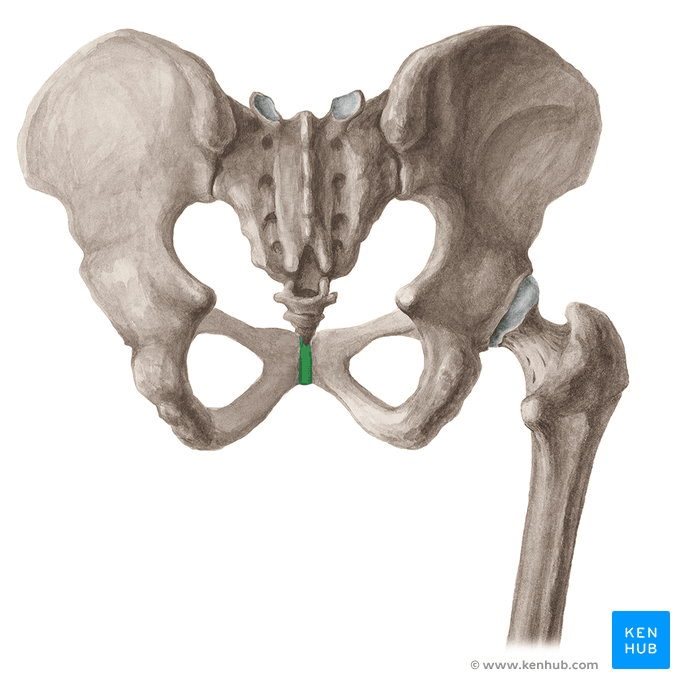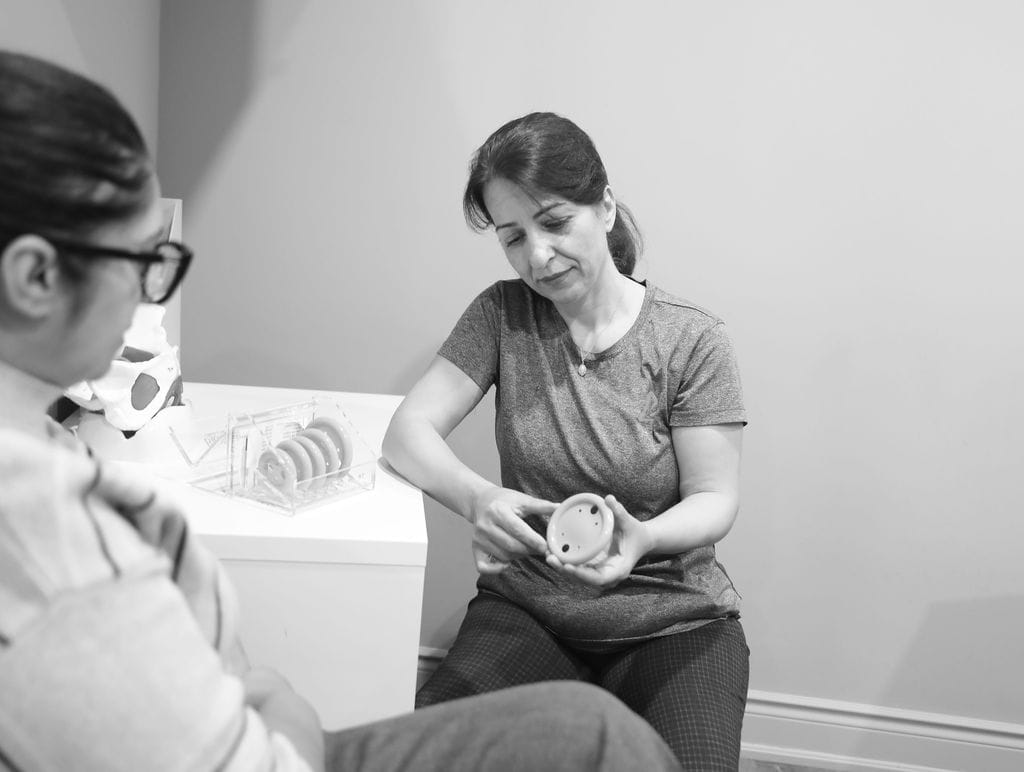Pelvic pain is discomfort or pain experienced in the lower part of the abdomen, below the belly button and between the hips. This type of pain can affect both men and women and can arise from various conditions. The nature of pelvic pain can vary; it might be sharp, dull, intermittent, or constant, and can be acute (short-term) or chronic (lasting longer than six months).
What causes pelvic pain?

Common Causes of Pelvic Pain
In Women:
- Menstrual Cramps: Pain associated with menstruation (dysmenorrhea).
- Endometriosis: A condition where tissue similar to the lining inside the uterus grows outside of it.
- Ovarian Cysts: Fluid-filled sacs on the ovaries.
- Pelvic Inflammatory Disease (PID): An infection of the reproductive organs.
- Fibroids: Noncancerous growths in the uterus.
- Ectopic Pregnancy: A pregnancy occurring outside the uterus.
- Interstitial Cystitis: Chronic inflammation of the bladder.
In Men:
- Prostatitis: Inflammation of the prostate gland.
- Hernia: When an organ pushes through an opening in the muscle or tissue.
- Chronic Pelvic Pain Syndrome (CPPS): Persistent pain in the pelvic region.
Both Genders:
- Urinary Tract Infections (UTIs): Infections in any part of the urinary system.
- Appendicitis: Inflammation of the appendix.
- Gastrointestinal Issues: Conditions such as irritable bowel syndrome (IBS) or diverticulitis.
- Musculoskeletal Issues: Problems with muscles, ligaments, or joints in the pelvic area.
What are the symptoms related to pelvic pain?
Symptoms of pelvic pain can vary widely depending on the underlying cause and the individual. Here are common symptoms associated with pelvic pain:
General Symptoms of Pelvic Pain
- Aching or Discomfort: Persistent or intermittent pain in the lower abdomen or pelvis.
- Sharp or Stabbing Pain: Sudden, severe pain that can come and go.
- Cramping: Muscle cramps or spasms in the pelvic region.
- Pressure: A feeling of heaviness or pressure in the pelvis.
- Burning or Stinging Sensation: Particularly during urination or bowel movements.
- Pain During Physical Activity: Pain that worsens with movement, exercise, or sexual intercourse.
Additional Symptoms in Women
- Menstrual Irregularities: Pain associated with periods (dysmenorrhea), heavy bleeding, or spotting between periods.
- Pain During Ovulation: Mid-cycle pain known as mittelschmerz.
- Pain During Sexual Intercourse: Discomfort or pain during or after sex (dyspareunia).
- Vaginal Discharge: Unusual discharge that might indicate infection.
- Pain with Urination: Particularly if associated with urinary tract infections or interstitial cystitis.
Additional Symptoms in Men
- Pain in the Testicles or Scrotum: Discomfort that can radiate to the pelvic region.
- Urinary Symptoms: Difficulty urinating, frequent urination, or pain during urination.
- Pain with Ejaculation: Discomfort during or after ejaculation.
Symptoms Related to Specific Conditions
- Endometriosis: Severe menstrual cramps, pain during intercourse, and infertility.
- Pelvic Inflammatory Disease (PID): Fever, unusual vaginal discharge, and pain during sex.
- Ovarian Cysts: Sudden, severe pain if a cyst ruptures or causes twisting of the ovary (torsion).
- Ectopic Pregnancy: Sharp, stabbing pain, vaginal bleeding, dizziness, or fainting.
- Interstitial Cystitis: Chronic pelvic pain, urinary urgency and frequency, and pain during intercourse.
- Prostatitis: Pain in the pelvis, genitals, or lower back; difficulty urinating; flu-like symptoms.
- Appendicitis: Sudden, sharp pain that starts near the belly button and moves to the lower right abdomen, accompanied by fever, nausea, and vomiting.
- Hernia: A noticeable bulge in the groin or abdomen, pain that worsens with lifting or bending.
How is pelvic pain diagnosed?
Diagnosing the cause of pelvic pain typically involves:
- Medical History and Physical Examination: Initial evaluation by a healthcare provider.
- Imaging Tests: Ultrasound, CT scans, or MRI to visualize internal structures.
- Laboratory Tests: Blood tests, urine tests, or cultures to check for infections.
- Laparoscopy: A minimally invasive surgical procedure to look inside the pelvic cavity.
How is pelvic pain treated?
Treatment depends on the underlying cause and may include:
- Medications: Pain relievers, antibiotics (for infections), or hormonal treatments.
- Physiotherapy: A pelvic health physiotherapist can help with pelvic pain and related symptoms.
- Surgery: In some cases, surgical intervention may be necessary.
- Lifestyle Changes: Dietary adjustments, stress management, and other modifications.
If you or someone you know is experiencing persistent or severe pelvic pain, it’s important to seek medical attention to determine the underlying cause and appropriate treatment.
Where can I find a pelvic health physiotherapist in Mississauga?
We have 8 locations with pelvic health physiotherapists to help you.
- Pelvic Health Physiotherapy Etobicoke – Triangle Physiotherapy Etobicoke
- Oakville Pelvic Health – Triangle Physiotherapy Oakville
- Pelvic Health Physiotherapy North York – Triangle Physiotherapy North York
- Mississauga Pelvic Health – Triangle Physiotherapy Mississauga
- Downtown Pelvic Health – Triangle Physiotherapy King West
- Uptown Toronto Pelvic Health – Triangle Physiotherapy Lawrence Park
- Pelvic Physiotherapy Downtown Toronto – Triangle Physiotherapy Queens Quay
- Mississauga Pelvic Health – Triangle Physiotherapy Erin Mills
Pelvic pain can significantly impact daily life, but targeted physiotherapy can help alleviate discomfort and improve quality of life. If you are looking for professional physiotherapy services to manage pelvic pain, there are clinics in physiotherapy Etobicoke, Oakville, North York, Toronto, Lawrence Park, Queens Quay, Erin Mills, Mississauga, and Liberty Village. These locations offer specialized care and personalized treatment plans to support your pelvic health and overall well-being.
Pubic bone pain after giving birth, also known as postpartum pubic symphysis diastasis or symphysis pubis dysfunction (SPD), is a condition that affects some women following childbirth. This pain is usually centered around the pubic symphysis, the joint at the front of the pelvis where the two halves of the pelvic bone meet.

What are the causes of post-partum pubic bone pain?
- Hormonal Changes: During pregnancy, the body releases the hormone relaxin, which loosens the ligaments in the pelvis to prepare for childbirth. This can sometimes lead to instability or separation of the pubic symphysis.
- Physical Stress: The process of labor and delivery can put significant strain on the pelvic area, particularly if the baby is large, labor is prolonged, or delivery involves interventions such as forceps or vacuum extraction.
- Pre-existing Conditions: Women who had SPD or pelvic girdle pain during pregnancy are more likely to experience pubic bone pain postpartum.
What are the symptoms of symphysis pubis dysfunction (SPD)?
Pain:
- Burning, shooting, grinding or stabbing
- Mild or prolonged
- Usually relieved by rest
- Radiating to the back, abdomen, groin, perineum and legs
- Disappears commonly after giving birth (not in every case)
- Discomfort sense onto the front of the joint
- Clicking of the lower back, hip joints and sacroiliac joints when changing position
- Difficulty in movements like abduction and adduction
Locomotor difficulty:
- Walking
- Ascending or descending stairs
- Rising from a chair
- Weight-bearing activities
- Standing on one leg
- Turning in bed
- Depression, possibly due to the discomfort
How is pubic bone pain treated?
- Rest and Activity Modification: Reducing activities that exacerbate pain, such as standing for long periods, lifting heavy objects, or walking long distances.
- Pelvic Physiotherapy: A physiotherapist can provide exercises to strengthen the pelvic floor, abdominal, and hip muscles, and help stabilize the pelvic area. Manual therapy may also be used to realign the pelvis.
- Pain Relief: Over-the-counter pain medications such as acetaminophen or non-steroidal anti-inflammatory drugs (NSAIDs) may be recommended. Always consult with a healthcare provider before taking any medication, especially if breastfeeding.
- Supportive Devices: Wearing a pelvic support belt can help stabilize the pelvis and reduce pain.
- Heat and Cold Therapy: Applying heat or cold packs to the affected area can help reduce pain and inflammation.
How can a pelvic health physiotherapist help with pubic bone pain?
A pelvic health physiotherapist can be of immense help with symphysis pubis dysfunction (SPD). A pelvic health physiotherapist can provide:
- Guidance on movement techniques for daily activities such as climbing stairs, bending, lifting, and feeding the baby.
- Education on gradually advancing exercises aimed at neuromuscular re-education, core stability, and proper posture.
- Hands-on therapy, including pelvic evaluations and muscle energy techniques to correct pelvic alignment.
- Evaluations to identify tissue dysfunction or lack of coordination.
Where can I find a pelvic health physiotherapist in Mississauga?
We have 8 locations with pelvic health physiotherapists to help you.
- Pelvic Health Physiotherapy Etobicoke – Triangle Physiotherapy Etobicoke
- Oakville Pelvic Health – Triangle Physiotherapy Oakville
- Pelvic Health Physiotherapy North York – Triangle Physiotherapy North York
- Mississauga Pelvic Health – Triangle Physiotherapy Mississauga
- Downtown Pelvic Health – Triangle Physiotherapy King West
- Uptown Toronto Pelvic Health – Triangle Physiotherapy Lawrence Park
- Pelvic Physiotherapy Downtown Toronto – Triangle Physiotherapy Queens Quay
- Mississauga Pelvic Health – Triangle Physiotherapy Erin Mills
Recovering from pubic bone pain after giving birth can be supported through targeted physiotherapy. If you’re looking for specialized care, consider physiotherapy in Etobicoke, Oakville, North York, Toronto, Lawrence Park, Queens Quay, Erin Mills, Mississauga, or Liberty Village. Experienced physiotherapists in these areas can help you manage pain and regain strength and mobility through personalized treatment plans.
It’s great when sex feels natural and pleasurable, but what happens when that stops happening? Let’s dive into a topic that affects many men but is often shrouded in silence: erectile dysfunction (ED). It’s a sensitive subject, but an important one to address. Did you know that your pelvic floor muscles play a significant role in erectile function? In this blog, we’ll explore how the pelvic floor impacts ED and what can be done to restore function and sexual confidence.
What is the pelvic floor?
Picture the pelvic floor as a team of strong muscles located in your pelvic area. These muscles form the base of the pelvis and support your bladder, rectum, and prostate. These muscles can also face challenges in strength, endurance, or overall quality of muscle tone. This can happen for several reasons, but once it occurs the pelvic floor gets used to these patterns. This can be overwhelming and frustrating.
How does the pelvic floor relate to erectile dysfunction?

Well, the pelvic floor muscles are responsible for a range of functions, including blood flow regulation, maintaining erections, and controlling ejaculation. When these muscles become weak or tense, it can lead to difficulties in achieving or sustaining an erection. Imagine as though there is cement in your muscles, it makes them look strong but they’re not actually functional. These tight muscles can prevent arousal and effective orgasms. It takes more than just strengthening to improve the quality of contraction in these muscles. It is important for a strong muscle to be able to relax, as well as contract for optimal function. Pelvic physiotherapy treatment is focused on restoring that function.
How is the pelvic floor strengthened?
The good news is that you have the power to strengthen your pelvic floor muscles and potentially improve erectile function. A start to strengthening can be kegel exercises, however these are not the answer for everyone. Kegels are similar to a bicep contraction, and the strength plateaus if strengthening only involves kegels. True strength will take more than just 100 kegels. It takes functional training and pelvic floor strengthening in different ranges. It also involves strengthening the other muscles in the inner unit such as the deep core, diaphragm, and multifidi.
Relaxation Techniques:
Sometimes, it’s not just about strength but also about letting go of tension. Stress and anxiety can have a significant impact on your sexual performance. Learning relaxation techniques, such as deep breathing exercises and mindfulness, can help release the tension in your pelvic floor muscles and create a more relaxed and conducive environment for sexual experiences. Another powerful tool is learning how to effectively reverse kegel and strengthen the pelvic floor in the lengthened range.
While self-help exercises are a great start, seeking professional guidance from a pelvic floor physiotherapist can take your journey to the next level. These knowledgeable experts can assess your specific situation, provide tailored exercises, and guide you through techniques that target your pelvic floor muscles. They understand the challenges you may face and approach the topic with empathy and professionalism, creating a safe space for discussion.
Where can I find a pelvic health physiotherapist in Mississauga?
We have 8 locations with pelvic health physiotherapists to help you.
- Pelvic Health Physiotherapy Etobicoke – Triangle Physiotherapy Etobicoke
- Oakville Pelvic Health – Triangle Physiotherapy Oakville
- Pelvic Health Physiotherapy North York – Triangle Physiotherapy North York
- Mississauga Pelvic Health – Triangle Physiotherapy Mississauga
- Downtown Pelvic Health – Triangle Physiotherapy King West
- Uptown Toronto Pelvic Health – Triangle Physiotherapy Lawrence Park
- Pelvic Physiotherapy Downtown Toronto – Triangle Physiotherapy Queens Quay
- Mississauga Pelvic Health – Triangle Physiotherapy Erin Mills
Improving pelvic floor health can play a significant role in managing erectile dysfunction. If you’re seeking expert guidance, consider physiotherapy in Etobicoke, Oakville, North York, Toronto, Lawrence Park, Queens Quay, Erin Mills, Mississauga, or Liberty Village. Skilled physiotherapists in these areas can provide personalized care to help you improve pelvic floor function and overall well-being.
Let’s talk about stretches to do when pregnant. Engaging in stretching exercises during pregnancy can contribute to the elongation of your muscles and overall body flexibility, providing increased comfort whether you’re strolling through the grocery store, engaging in a workout, or simply relaxing. The soothing effects of stretching are particularly helpful during pregnancy, offering significant benefits to your body. Moreover, incorporating stretching into your routine at this stage can aid in preparing your muscles and joints for the challenges of labor in the future.

What are the benefits of stretching during pregnancy?
Stretching during pregnancy can offer several benefits for expectant mothers. However, it’s crucial to consult with a healthcare provider before starting any new exercise routine during pregnancy. Assuming that the healthcare provider gives the green light, here are some potential benefits of stretching during pregnancy:
- Improved Flexibility
- Reduced Muscle Tension
- Enhanced Circulation
- Relief from Discomfort
- Prevention of Muscle Strain
- Promotion of Relaxation
- Preparation for Labor
- Posture Improvement
- Emotional Well-being
- Better Sleep
What can I do to stretch safely when I am pregnant?
- First and foremost, check with your doctor or midwife to ensure that it is safe for your pregnancy.
- Warm-up
- Do gentle and controlled movements
- Avoid over-doing it
- Listen to your body
- Maintain good posture
- Use the right breathing techniques
- Hydrate
What are some of the stretches I can do when pregnant?




Where can I find a pelvic health physiotherapist in Mississauga?
We have 8 locations with pelvic health physiotherapists to help you.
- Pelvic Health Physiotherapy Etobicoke – Triangle Physiotherapy Etobicoke
- Oakville Pelvic Health – Triangle Physiotherapy Oakville
- Pelvic Health Physiotherapy North York – Triangle Physiotherapy North York
- Mississauga Pelvic Health – Triangle Physiotherapy Mississauga
- Downtown Pelvic Health – Triangle Physiotherapy King West
- Uptown Toronto Pelvic Health – Triangle Physiotherapy Lawrence Park
- Pelvic Physiotherapy Downtown Toronto – Triangle Physiotherapy Queens Quay
- Mississauga Pelvic Health – Triangle Physiotherapy Erin Mills
Performing safe stretches during pregnancy can help manage discomfort and improve flexibility. For personalized prenatal care and guidance, consider physiotherapy in Etobicoke, Oakville, North York, Toronto, Lawrence Park, Queens Quay, Erin Mills, Mississauga, or Liberty Village. Experienced physiotherapists in these areas can create tailored exercise plans to support your comfort and well-being throughout pregnancy.
March 8th marks International Women’s Day and Triangle Physiotherapy is proud to be able to empower women to advocate for themselves and their health needs.
Our goal is to encourage women to focus on their health, both, physical and mental. Build your healthcare team and schedule regular visits, in addition to exercising regularly and eating healthy.

Women’s Health and the Pelvic Floor
Women’s health is intricately connected to the well-being of the pelvic floor, a group of muscles, ligaments, and tissues supporting the uterus, bladder, and rectum. Maintaining a healthy pelvic floor is crucial for various functions, including urinary and bowel control, sexual function, and providing support during pregnancy. Pregnancy, childbirth, hormonal changes, and aging can impact the pelvic floor, leading to issues like incontinence, pelvic organ prolapse, and sexual dysfunction.
Maintaining a healthy lifestyle, proper posture, and seeking guidance from a pelvic health physiotherapist are essential for women’s pelvic floor health. Awareness and proactive care contribute to overall well-being, enabling women to lead active and fulfilling lives while addressing potential pelvic floor challenges.
What are the symptoms of Pelvic Floor Dysfunction?
Pelvic Floor Dysfunction (PFD) can manifest through various symptoms, which may vary in intensity and duration. Common signs of PFD include:
- Urinary Issues:
- Urinary incontinence: Involuntary leakage of urine.
- Frequent urination: The need to urinate more often than usual.
- Difficulty emptying the bladder: Struggling to fully release urine.
- Bowel Issues:
- Constipation: Difficulty passing stools or infrequent bowel movements.
- Straining during bowel movements: Experiencing difficulty while trying to have a bowel movement.
- Pelvic Pain:
- Pelvic pain or discomfort: Discomfort in the pelvic region, which may be persistent or intermittent.
- Pain during sexual intercourse: Discomfort or pain during sexual activity.
- Muscle Tension:
- Tight or spasming pelvic muscles: Increased muscle tension in the pelvic floor.
- Pelvic Organ Prolapse:
- The feeling of pressure or fullness in the pelvic area: Sensation of something bulging or descending into the vagina.
- Lower Back Pain:
- Chronic lower back pain: Discomfort or pain in the lower back region.
- Changes in Posture:
- Altered posture: Changes in the alignment of the spine and pelvis.
How a Pelvic Health Physiotherapist can help and what to expect?
A Pelvic Health Physiotherapist specializes in assessing and treating conditions related to the pelvic floor and surrounding areas. Here’s how they can help and what to expect during a session:
- Assessment:
- A thorough assessment of your medical history, pelvic health, and relevant symptoms.
- Physical examination, which may include internal and external assessments to evaluate the strength, flexibility, and coordination of the pelvic floor muscles.
- Education:
- Detailed explanation of pelvic anatomy and the role of pelvic floor muscles in various functions.
- Guidance on lifestyle factors, posture, and habits that may contribute to pelvic health issues.
- Pelvic Floor Exercises:
- Prescribing personalized pelvic floor exercises, to strengthen or relax specific muscles based on the assessment findings.
- Teaching proper technique and ensuring exercises are performed correctly.
- Manual Therapy:
- Hands-on techniques to release tension in the pelvic floor muscles or surrounding tissues.
- Myofascial release and trigger point therapy to address muscle knots or tightness.
- Biofeedback:
- Using biofeedback tools to provide real-time information about pelvic floor muscle activity.
- Assisting individuals in learning how to control and coordinate their pelvic floor muscles.
- Behavioral Strategies:
- Implementing behavioral strategies for managing and improving bladder and bowel function.
- Developing strategies for optimizing pelvic health during daily activities.
Where can I find a pelvic health physiotherapist in Mississauga?
We have 8 locations with pelvic health physiotherapists to help you.
- Pelvic Health Physiotherapy Etobicoke – Triangle Physiotherapy Etobicoke
- Oakville Pelvic Health – Triangle Physiotherapy Oakville
- Pelvic Health Physiotherapy North York – Triangle Physiotherapy North York
- Mississauga Pelvic Health – Triangle Physiotherapy Mississauga
- Downtown Pelvic Health – Triangle Physiotherapy King West
- Uptown Toronto Pelvic Health – Triangle Physiotherapy Lawrence Park
- Pelvic Physiotherapy Downtown Toronto – Triangle Physiotherapy Queens Quay
- Mississauga Pelvic Health – Triangle Physiotherapy Erin Mills
On International Women’s Day, let’s celebrate the strength and resilience of women everywhere. For those seeking expert support for their health and wellness, consider physiotherapy in Etobicoke, Oakville, North York, Toronto, Lawrence Park, Queens Quay, Erin Mills, Mississauga, or Liberty Village. Skilled physiotherapists in these areas are committed to empowering women through personalized care and treatment plans.
When we think about pelvic health, we often think of women’s issues, but did you know that men also have a pelvic floor? That’s right! The male pelvic floor is a group of muscles that support the bladder, bowel, and sexual organs.
However, just like any other muscle group, the male pelvic floor can become weakened or tense, leading to a variety of issues. For example, pelvic pain, urinary or fecal incontinence, and erectile dysfunction can all be caused by pelvic floor dysfunction.

What are the Causes of Pelvic Floor Dysfunction in Men?
When we think about pelvic health, we often think of women’s issues, but did you know that men also have a pelvic floor? That’s right! The male pelvic floor is a group of muscles that support the bladder, bowel, and sexual organs.
However, just like any other muscle group, the male pelvic floor can become weakened or tense, leading to a variety of issues. For example, pelvic pain, urinary or fecal incontinence, and erectile dysfunction can all be caused by pelvic floor dysfunction.
The pelvic floor conditions we see in men are:
- Post-Prostatectomy Incontinence
- Post-prostatectomy Erectile dysfunction
- Pelvic Pain – Testicular & Penile pain, Chronic Prostatitis
How is Pelvic Floor Dysfunction diagnosed in Men?
Once you come in for an initial assessment, a qualified pelvic health physiotherapist will begin by taking a detailed medical history and a review of your symptoms, followed by an assessment of your symptoms and pelvis.
Once the cause of your pain or dysfunction has been diagnosed, your pelvic health physiotherapist will discuss the findings with you, as well as explain treatment options and expected outcomes.
What to Expect During Pelvic Floor Physiotherapy for Men?
Your pelvic floor physiotherapist will design an individual treatment plan that would aim to meet your goals, which may include one or more of the following; pelvic floor and pelvic muscle exercises, education, mindfulness and relaxation techniques, and bladder and bowel training.
Where can I find a men’s pelvic health physiotherapist in Mississauga?
We have 8 locations with pelvic health physiotherapists to help you.
- Pelvic Health Physiotherapy Etobicoke – Triangle Physiotherapy Etobicoke
- Oakville Pelvic Health – Triangle Physiotherapy Oakville
- Pelvic Health Physiotherapy North York – Triangle Physiotherapy North York
- Mississauga Pelvic Health – Triangle Physiotherapy Mississauga
- Downtown Pelvic Health – Triangle Physiotherapy King West
- Uptown Toronto Pelvic Health – Triangle Physiotherapy Lawrence Park
- Pelvic Physiotherapy Downtown Toronto – Triangle Physiotherapy Queens Quay
- Mississauga Pelvic Health – Triangle Physiotherapy Erin Mills
Pelvic Health physiotherapists advocate the importance of educating individuals about their pelvic health. They are often asked by patients if an internal exam is necessary. Many patients refrain from seeking help for pelvic health issues because of the fear of internal examination. While internal exams are not a must, they can be very helpful to pelvic health physiotherapists in determining the condition of the pelvic floor.
What is an Internal Pelvic Exam?
A pelvic floor assessment, which may or may not include an internal pelvic exam, entails a pelvic health physiotherapist examining the pelvic floor muscles, tissues, and organs by inserting a gloved hand into the vagina or rectum. This examination is crucial for assessing the well-being and performance of the pelvic floor, allowing for the detection of any possible problems or issues.
Why is an internal pelvic exam important?
- Detailed Assessment of Pelvic Floor Muscles: An internal pelvic exam allows the physiotherapist to assess the tone, strength, flexibility, and coordination of the pelvic floor muscles. This information is crucial in developing an accurate understanding of the patient’s pelvic health.
- Identification of Muscle Imbalances: Through internal palpation, a physiotherapist can identify any muscle imbalances or asymmetries in the pelvic floor. This helps in tailoring the treatment plan to address specific issues, such as hypertonic (overactive) or hypotonic (underactive) muscles.
- Assessment of Pelvic Organ Function: Internal examination enables the physiotherapist to assess the function of pelvic organs, such as the bladder, uterus, and rectum. This is important in cases where dysfunction or weakness in the pelvic floor muscles may be contributing to issues such as urinary incontinence or pelvic organ prolapse.
- Evaluation of Connective Tissues and Nerves: The internal exam allows the physiotherapist to assess the condition of connective tissues, ligaments, and nerves in the pelvic region. Dysfunction in these structures can contribute to pelvic pain and other symptoms, and the internal exam helps in identifying such issues.
- Assessment of Trigger Points and Tenderness: The physiotherapist can identify trigger points and areas of tenderness within the pelvic floor muscles. This information is crucial in designing a targeted treatment plan, which may include manual therapy techniques to release muscle tension.
- Feedback on Exercise Performance: During an internal pelvic exam, the physiotherapist may guide the patient through specific exercises to assess the effectiveness of pelvic floor muscle contractions. Real-time feedback helps the patient learn proper muscle engagement and control.
- Patient Education and Empowerment: The internal exam provides an opportunity for the physiotherapist to educate the patient about their pelvic floor anatomy, function, and any specific issues identified during the assessment. This empowers the patient to actively participate in their treatment plan and make lifestyle changes that support pelvic health.

Do I have to have an internal exam during a pelvic health assessment?
It’s important to note that internal pelvic exams are conducted with the patient’s informed consent, and physiotherapists ensure a comfortable and respectful environment during the assessment. The goal is to provide comprehensive care and address the specific needs of individuals experiencing pelvic health issues. That being said, if you are not comfortable being internally examined, please let your physiotherapist know before the start of your assessment.
How do I prepare for an internal pelvic exam?
Preparing for an internal pelvic exam involves a combination of physical and mental preparation. It’s essential to communicate openly with your pelvic health physiotherapist and follow their instructions. Here are some general guidelines to help you prepare:
Comfortable Clothing: Wear comfortable, easy-to-remove clothing. You may be asked to undress from the waist down, so wearing a skirt or loose pants can be convenient.
Relaxation Techniques: Practice relaxation techniques such as deep breathing to help ease anxiety and tension. Relaxing your pelvic muscles can make the exam more comfortable.
Communicate with your Physiotherapist: Inform your pelvic health physiotherapist about any concerns, fears, or past traumatic experiences related to pelvic exams. They can adjust their approach and provide additional support.
Ask Questions: Feel free to ask any questions you may have about the procedure. Knowing what to expect can help alleviate anxiety.
Where can I find a pelvic health physiotherapist in Mississauga?
We have 8 locations with pelvic health physiotherapists to help you.
- Pelvic Health Physiotherapy Etobicoke – Triangle Physiotherapy Etobicoke
- Oakville Pelvic Health – Triangle Physiotherapy Oakville
- Pelvic Health Physiotherapy North York – Triangle Physiotherapy North York
- Mississauga Pelvic Health – Triangle Physiotherapy Mississauga
- Downtown Pelvic Health – Triangle Physiotherapy King West
- Uptown Toronto Pelvic Health – Triangle Physiotherapy Lawrence Park
- Pelvic Physiotherapy Downtown Toronto – Triangle Physiotherapy Queens Quay
- Mississauga Pelvic Health – Triangle Physiotherapy Erin Mills
Understanding the need for an internal exam during a pelvic health assessment can help you make informed decisions about your care. If you’re looking for specialized support, consider physiotherapy in Etobicoke, Oakville, North York, Toronto, Lawrence Park, Queens Quay, Erin Mills, Mississauga, or Liberty Village. Experienced physiotherapists in these areas can provide comprehensive pelvic health assessments tailored to your comfort and needs.
There are a lot of unknowns when going into labour and delivery. Whether it’s your first, second, or third child, every birth is very different, and daunting in its way. Some women hope to have a vaginal delivery, while others schedule or have emergency C-sections. Both forms of delivery are viable options however they can have different effects on your body postpartum. A cesarean section (C-section) can be life-saving for both the baby and mom. A common misconception is that a C-section is somehow “easier” but that is far from the truth. A C-section is a major surgery, that not only affects your abdominal muscles but also your pelvic floor. In this blog post, we will explore what C-sections are, their impact on the pelvic floor, and the benefits of pelvic floor physiotherapy for women who have had C-sections.
What is a C-section?
A C-section is a surgical procedure that involves delivering a baby through an incision made in the mother’s abdomen and uterus. It is usually performed either if the mother schedules a C-section, which may be for a variety of reasons, or in the case of an emergency. This may be done to save and protect the mother and baby. Some reasons for a C-section include a large baby, breech position, multiple pregnancies, maternal health conditions such as high blood pressure (preeclampsia), or labor not progressing as expected (dilation plateauing).
What impact does a C-Section have on the pelvic floor?
Many people assume that a C-section does not have any impact on the pelvic floor because the baby does not pass through the vagina. However, the pelvic floor can still be affected during a C-section. During the procedure, the surgeon may need to move the bladder and intestines to access the uterus, which can cause temporary weakness and stretching of the pelvic floor muscles. The stretching can also occur due to the weight of the baby pushing down on the pelvic floor during pregnancy. The procedure can also impact the nerves supplying the bladder and bowel, thereby reducing or completely removing your urge to pee. This altered sensation can improve over time, but may sometimes linger for years postpartum. In some cases, the sensation never comes back.
After the C-section, some women may experience pain and discomfort in the pelvic area, which can be exacerbated by activities such as lifting and carrying their newborn. This can lead to muscle tension and tightness, which can cause further issues down the line.
What are the benefits of pelvic floor physiotherapy after a C-section?
Pelvic floor physiotherapy is a specialized form of physical therapy that focuses on strengthening the pelvic floor muscles, improving their function and flexibility, and treating any pain or discomfort in the pelvic area. It can be very beneficial for women who have had a C-section, as it can help to address any issues that may have arisen due to the surgery.

How can healing and recovery be improved after a C-Section?
Pelvic floor physiotherapy can help to speed up the healing process after a C-section. It can help to reduce pain and swelling in the pelvic area, improve circulation, and promote tissue regeneration. It can also help to prevent the formation of scar tissue, which can cause discomfort and pain in the pelvic area. Keloid scarring is a type of scarring at the C section where the tissue raises and forms adhesions. This can be painful in some cases or uncomfortable and can impact sensation in the region.
- Address bladder and bowel issues
After a C-section, some women may experience bladder and bowel issues such as incontinence, urgency, or difficulty emptying their bladder or bowel. This may be a product of the nerves being impacted during the surgery or other factors. Pelvic floor physiotherapy can help to address these issues by strengthening the pelvic floor muscles and improving their function. It can also help to retrain the bladder and bowel to function properly and reduce incontinence.
- Improve sexual function
Many women may experience a decrease in sexual function after a C-section due to pain and discomfort in the pelvic area. This may be due to feelings of pelvic heaviness, perineum discomfort, or scar tissue. Pelvic floor physiotherapy can help to address these issues by reducing pain and discomfort and improving the function of the pelvic floor muscles. This can lead to an improvement in sexual function and overall sexual satisfaction.
Seeing a pelvic therapist post-C-section can also get you back to activities you love doing! This can include running, weight lifting, etc. There is no timeline for how quickly you should be recovering. Our bodies take time to heal postpartum. Your body is not broken, but working with a pelvic therapist can help you feel more like yourself again.
Where can I find a pelvic health physiotherapist in Mississauga?
We have 8 locations with pelvic health physiotherapists to help you.
- Pelvic Health Physiotherapy Etobicoke – Triangle Physiotherapy Etobicoke
- Oakville Pelvic Health – Triangle Physiotherapy Oakville
- Pelvic Health Physiotherapy North York – Triangle Physiotherapy North York
- Mississauga Pelvic Health – Triangle Physiotherapy Mississauga
- Downtown Pelvic Health – Triangle Physiotherapy King West
- Uptown Toronto Pelvic Health – Triangle Physiotherapy Lawrence Park
- Pelvic Physiotherapy Downtown Toronto – Triangle Physiotherapy Queens Quay
- Mississauga Pelvic Health – Triangle Physiotherapy Erin Mills
Seeing a pelvic floor physiotherapist after a C-section can be crucial for recovery and regaining strength. If you’re looking for specialized care, consider physiotherapy in Etobicoke, Oakville, North York, Toronto, Lawrence Park, Queens Quay, Erin Mills, Mississauga, or Liberty Village. Skilled physiotherapists in these locations can provide personalized post-C-section care to support your healing journey.
Triangle Physiotherapy in Mississauga is a full-service clinic that offers specialized services like Pelvic Health Physiotherapy. Our pelvic health physiotherapists are trained professionals who, apart from being experts in their field, are also empathetic individuals who understand the sensitive nature of the conditions that make people seek pelvic health physiotherapy.
Tell me more about your Mississauga Pelvic Health physiotherapists.

Our Mississauga Pelvic Health physiotherapists have training in the field of pelvic health physiotherapy and are committed to providing the best care to the community in Mississauga, be it new moms, women with prolapse or incontinence issues, pessary fittings, labour and delivery support, and more. We also have a pelvic health physiotherapist who is trained to help children. Our pelvic health physiotherapists are also able to help men with their pelvic health issues.
What type of conditions can a pelvic floor physiotherapist treat?
Some of the conditions treated by our Mississauga Pelvic Health physiotherapists are:
- Incontinence (urinary and fecal)
- Pelvic organ prolapse and pessary fittings
- Constipation
- Diastasis recti
- Vaginismus
- Pelvic pain
- Pelvic girdle pain during pregnancy and postpartum)
- Coccydynia (tailbone pain)
- Pudendal neuralgia
- Interstitial cystitis
- Female and Male Sexual dysfunction
- Prostatitis
- Rectal pain and dysfunction
- Irritable bowel syndrome
- Anal incontinence
- Anal fissures and fistulas
- Anal neuralgia
- Rectal prolapse
I just gave birth recently. How soon should I see a pelvic health physiotherapist
The pelvic floor muscles may get stretched or damaged during delivery, whether by C-Section or vaginal. This may cause issues of the pelvic floor that manifest as urinary or fecal incontinence, urinary urgency or frequency, pain during sexual activity, pelvic organ prolapse, pelvic pain, lower back pain, diastasis recti, or scar pain. Many of these issues can be addresed by pelvic health physiotherapy, however, our pelvic physiotherapists in Mississauga recommend waiting at least six weeks after delivery to allow the body time to heal from childbirth.
Can I speak to a pelvic health physiotherapist in Mississauga prior to booking a consultation?
We can certainly connect you with the best pelvic floor physiotherapist in Mississauga that can answer any questions you may have. Click here to book a discovery call.
Where can I find a pelvic health physiotherapist in Mississauga?
We have 8 locations with pelvic health physiotherapists to help you.
- Pelvic Health Physiotherapy Etobicoke – Triangle Physiotherapy Etobicoke
- Oakville Pelvic Health – Triangle Physiotherapy Oakville
- Pelvic Health Physiotherapy North York – Triangle Physiotherapy North York
- Mississauga Pelvic Health – Triangle Physiotherapy Mississauga
- Downtown Pelvic Health – Triangle Physiotherapy King West
- Uptown Toronto Pelvic Health – Triangle Physiotherapy Lawrence Park
- Pelvic Physiotherapy Downtown Toronto – Triangle Physiotherapy Queens Quay
- Mississauga Pelvic Health – Triangle Physiotherapy Erin Mills
“Finding the right pelvic health physiotherapist is crucial for effective treatment and recovery. Triangle Physiotherapy offers expert care across the GTA, including Physiotherapy in Etobicoke, Oakville, North York, Toronto, Lawrence Park, Queens Quay, Erin Mills, Mississauga, and Liberty Village. Our skilled physiotherapists specialize in pelvic health, providing personalized treatment plans to help you achieve the best possible outcomes.”
Written by Roshni Ravi, Pelvic Health Physiotherapist.
Sexual health is an important aspect of overall health and well-being, but it’s not always an easy topic to talk about. Many women experience sexual health dysfunctions at some point in their lives, but they may feel embarrassed or ashamed to seek help by way of pelvic floor physiotherapy. There are currently large gaps in the sexual education provided at the elementary school level. Many sex ed classes are focused on birth control and how terrible periods are.
But there is not enough information, if any, on sexual health conditions and how to seek help. We’ve had a lot of conversations with patients about what they wish they had learned in sex-ed. In this blog post, we’ll explore some of the most commonly asked questions about sexual health dysfunctions in women and offer some tips for managing them.
What is pelvic floor physiotherapy?

Pelvic floor physiotherapy focuses on treating the muscles, ligaments, and connective tissues of the pelvic floor which is a group of muscles that form a supportive hammock-like structure at the base of the pelvis. They play a key role in maintaining continence, supporting the pelvic organs, and providing stability to the spine and hips.
Pelvic floor physiotherapy involves a range of exercises, manual therapy techniques, and education to help individuals with pelvic floor dysfunction. Common conditions that may benefit from pelvic floor physiotherapy include:
- urinary and fecal incontinence,
- pelvic pain,
- pelvic organ prolapse, and
- sexual dysfunction.
Why am I suffering from a low libido? Can pelvic floor physiotherapy help?
Many women experience a decrease in sexual desire at some point in their lives. This can be caused by a variety of factors, including stress, hormonal imbalances, and relationship issues. To manage low libido, it’s important to address any underlying issues and make self-care a priority. This can include:
- practicing stress-management techniques,
- getting enough sleep, and
- engaging in regular exercise.
Why does it hurt to have sex?
Painful intercourse, also known as dyspareunia, is a common sexual health dysfunction in women. It can be caused by a variety of factors, including vaginal dryness, infections, and hormonal imbalances. To manage painful intercourse, it’s important to work with a healthcare provider to identify the underlying cause and develop a treatment plan. This may include using:
- lubricants,
- treating infections,
- or using hormonal therapy.
I struggle to orgasm during sex, why does that happen?
Many women struggle to achieve orgasm during sexual activity which can be caused by a variety of factors, including, stress, relationship issues, and hormonal imbalances. To manage orgasmic dysfunction, it’s important to work with a healthcare provider or therapist to address any underlying issues and develop strategies for improving sexual function. This may include:
- practicing mindfulness or
- engaging in self-exploration techniques.
My vagina feels like a fort that is impenetrable. Why can I not have sexual intercourse?
Vaginismus is a condition in which the muscles of the vaginal wall contract involuntarily, making intercourse difficult or impossible. It can be caused by a variety of factors, including past trauma and anxiety. To manage vaginismus, it’s important to work with a healthcare provider or therapist to address any underlying issues and develop strategies for managing anxiety and relaxing the pelvic floor muscles.
What is vulvodynia? Do I need pelvic floor physiotherapy?
Vulvodynia is a chronic pain condition that affects the vulva, or external genitalia. It can cause burning, stinging, or itching sensations, and can make sexual activity painful or uncomfortable. To manage vulvodynia, it’s important to work with a healthcare provider to identify the underlying cause and develop a treatment plan. This may include:
- using topical creams or medications,
- practicing relaxation techniques, or
- seeing a pelvic health physiotherapist.
Help! I pee my pants!

Urinary incontinence is a common condition in which urine leaks from the bladder involuntarily. It can be caused by a variety of factors, including hormonal changes, pregnancy, and pelvic floor dysfunction. To manage urinary incontinence, it’s important to work with a healthcare provider or pelvic floor physiotherapist to develop a treatment plan. This may include:
- pelvic floor exercises,
- bladder training, or
- medications.
What are the signs of menopause?
Menopause can cause a variety of changes in sexual function, including vaginal dryness, decreased libido, and painful intercourse. To manage these changes, it’s important to work with a healthcare provider to develop a treatment plan. This may include:
- using hormonal therapy,
- vaginal moisturizers, or
- engaging in regular sexual activity to maintain pelvic floor health.
Where can I find a pelvic health physiotherapist near me?
We have 8 locations with pelvic health physiotherapists to help you.
- Pelvic Health Physiotherapy Etobicoke – Triangle Physiotherapy Etobicoke
- Oakville Pelvic Health – Triangle Physiotherapy Oakville
- Pelvic Health Physiotherapy North York – Triangle Physiotherapy North York
- Mississauga Pelvic Health – Triangle Physiotherapy Mississauga
- Downtown Pelvic Health – Triangle Physiotherapy King West
- Uptown Toronto Pelvic Health – Triangle Physiotherapy Lawrence Park
- Pelvic Physiotherapy Downtown Toronto – Triangle Physiotherapy Queens Quay
- Mississauga Pelvic Health – Triangle Physiotherapy Erin Mills
In conclusion…
Many women experience sexual health dysfunctions at some point in their lives, but they may feel embarrassed or ashamed to seek help. It’s important to remember that sexual health is an important aspect of overall health and well-being, and it’s important to prioritize it in your self-care routine. If you’re experiencing any issues related to sexual function, don’t hesitate to talk to your healthcare provider or a therapist about your options. Remember, there is help!
Click here to book your consultation with one of our knowledgeable and compassionate pelvic health physiotherapists.
“Pelvic floor physiotherapy is essential for improving sexual health and overall well-being. Triangle Physiotherapy offers specialized pelvic health services across the GTA, including Physiotherapy in Etobicoke, Oakville, North York, Toronto, Lawrence Park, Queens Quay, Erin Mills, Mississauga, and Liberty Village. Our experienced team can help you address pelvic floor issues and enhance your sexual health through personalized treatment plans.”











